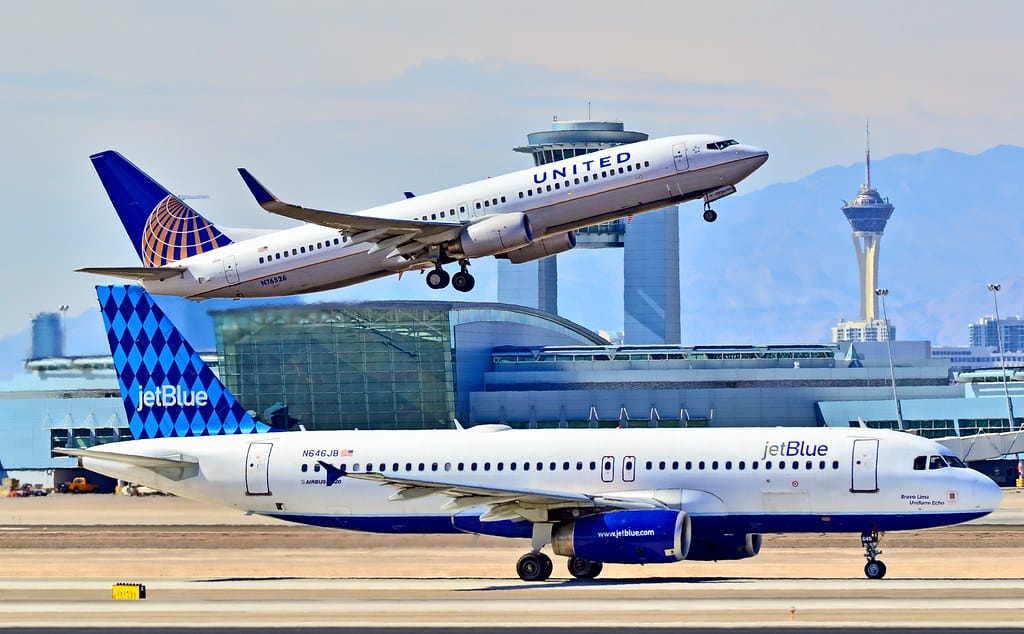In today’s issue: United and JetBlue move closer to something, JetBlue exits the VC space, Spirit enters the Essential Air Market, and Ben Gurion Airport takes fire
The Headlines
🔵Last week, American Airlines and JetBlue ended talks on potentially reviving a partnership after their Northeast Alliance was blocked by a judge under the Biden administration. Following that, Reuters quickly reported that JetBlue and United were negotiating a partnership. Finally, the Italian publication Corriere della Sera reported that United, following an initial partnership, was eyeing a return to JFK and a potential merger with JetBlue down the line.
Except, is a merger going to be approved under even a potentially more merger-friendly (TBD on that one) Trump DOJ? Even if it is approved, a combined United/JetBlue would most certainly need to make some pretty significant concessions to get the deal across the regulatory finish line.
Ultimately, both of those questions—whether the merger would be approved and what kind of concessions it might require—will likely fall into the realm of antitrust law. When regulators consider challenging a merger, or when one becomes the subject of litigation, a key point of dispute is often how the market is defined. This involves determining which products, services, or geographic areas meaningfully compete with one another—something different parties often interpret quite differently.
In the context of this potential merger, JetBlue has a large presence at JFK, while United is the main carrier at Newark—so are they in the same market? Most certainly.
JetBlue is big in Boston, and United has hubs in Newark and D.C. Is the Northeast a single market? Maybe, though I’d think not
JetBlue is strong in both Boston and Fort Lauderdale, while United’s hubs are in Newark and D.C. So is the entire East Coast one big market? Probably not
The point here, though, is that how you define a market can dramatically affect whether a potential merger would be approved and what United/JetBlue might have to give up to get that approval. Regardless though, it’s hard to see a situation where a combined United/JetBlue would not need to divest a significant number of gates and slots in Newark and JFK. For United, the prospect of getting back into JFK in a meaningful way might make that tradeoff worthwhile. At the same time though, it seems like United has a pathway to getting back into JFK (via gates and slots from JetBlue) without needing to outright buy JetBlue.
For his part, Scott Kirby has been doing his best to butter up Trump recently by publicly supporting tariffs and cracking down on employees wearing Pro-Palestine pins.
🔵 JetBlue also made news today, announcing the sale of JetBlue Ventures to the aircraft lessor Sky Leasing. When Joanna Geraghty and Marty St. George took charge of JetBlue last year with a mandate to turn around the airline, it seemed likely that at some point JetBlue Ventures could get sold off or shut down—and that’s exactly what happened. As the saying goes, JetBlue decided to keep the main thing the main thing.
🔵Spirit Airlines seems to be entering the Essential Air Service (EAS) business, according to Ishrion Aviation. Spirit will partner with Contour Air, which primarily services EAS markets, and will operate flights to leisure destinations with Contour marketing the flights and providing ground handling. The new routes will be announced this summer.
At this point, I guess Spirit almost has little to lose, but this is certainly quite a step. Keep in mind, this news comes just 3 weeks after Dave Davis started as the new CEO of Spirit. Prior to Spirit, Davis was the President and CFO of SunCountry, which is an airline that has certainly learned to get creative in its business model.
While it’s not surprising to me to see a former SunCountry exec being willing to try something like this, it’s not clear to me this is Davis’s initiative, given that he’s only been in the role for 3 weeks. I’d also say that flying EAS routes is probably a bit more out there than flying around a bunch of cargo for Amazon (as SunCountry does). This, of course, all comes as the Trump administration seeks to cut $308 million from the EAS program in the upcoming budget.
🔵Newark’s woes continued this morning with 40 flights cancelled as of 9:19 AM EST. And we are only at the start of May. Needless to say, as we go into summer, things could get worse at Newark before they get better. This week, Transportation Secretary Sean Duffy is hoping to release his proposal for a new system to manage America’s ATC, which will include upgrading ATC systems and facilities.
🔵Ben Gurion airport came under fire over the weekend when a ballistic missile fired by the Iran-backed Houthis in Yemen landed on an access road close to the airport's main terminal. Though the airport only briefly halted operations, many foreign carriers once again suspended service to Israel for the time being. Notably though, as has been the case throughout much of the past 19 months, the Emirati carriers Etihad and FlyDubai are continuing to operate as normal to Israel.
This comes after Turkish Airlines and the Turkish LCC Pegasus gave up their slots at Ben Gurion last week. Prior to the October 7th terror attack on Israel, Turkish Airlines operated more than 10 daily flights to Tel Aviv, going up to 16 flights per day at certain times of the year. Perhaps the Emirati carriers will try and grab some of the newly available slots given their continued willingness to fly to Israel.
🎧 THINGS I’M LISTENING TO
🔵The Air Show’s latest pod breaking down everything you need to know about how Trump’s trade war with China will impact Boeing
📺 THINGS I’M WATCHING
🔵Patrick Shea reviewed United’s inaugural flight to Mongolia. As always, he gives great context on the route and United’s long history in the Asia-Pacific region.




